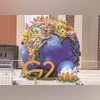In last year’s G20 Bali Declaration, China had a problem with the proposed paragraph No. 33, which called for private and bilateral creditors to take a haircut on their debt extended to stressed economies. Hence, a footnote was added to the final declaration including China’s position that multilateral development banks (MDBs) should also take a haircut.
“Noting that one member has divergent views on debt issues in paragraph 33, and emphasised the importance of debt treatment by multilateral creditors like MDBs,” the footnote said.
As television channels reported on Friday that there had been no consensus on finding a common language on the Russia-Ukraine war at the G20 Sherpa-level talks, a senior Indian delegate said that was not true, refusing to elaborate.
“That (a footnote) is certainly a possibility. But the only problem is the Russia-Ukraine war is a more serious issue than the debt issue with many countries holding divergent views,” an Indian diplomat said.
The G7 countries want a stronger condemnation of Russia for the Ukraine war but are willing to settle for the Bali language. Russia, on the other hand, believes the situation has drastically changed with the G7 countries indirectly getting involved in the war through supply of arms and ammunition to Ukraine. China, on the other hand, has officially maintained that G20 “is not the right forum to discuss geopolitical issues”.
Former BRICS Sherpa Sanjay Bhattacharyya said these groupings work on the basis of consensus, which means everybody must agree to the text of the document including a footnote. “In the UN system also, there is an explanation of vote, which then becomes part of the document. You can oppose but your view also gets reflected. Theoretically, it can be done that way. You can even mention the name of the countries. But all countries must agree to it,” he said.
However, Bhattacharyya said he would be very surprised if there is not a declaration or joint communique at the Delhi G20 meet. “When the discussion is not at the official Sherpa level but goes to the political level, either the foreign ministers or in the rare case even to the leaders’ level, then they have another way of looking at things. If they are tied down by one or two issues, that would be very unusual. If China doesn’t agree, then it would be isolated and identified,” he said.
With Chinese president Xi Jinping giving a miss to the G20 leaders’ summit in Delhi, there is increasing speculation that China doesn’t want to see a joint communique coming from Delhi.
During a press interaction, US National Security Advisor Jake Sullivan said If China wanted to come in and play the role of spoiler, that option was available to them. “What I will say is that, even though the (Chinese) leader is not going to be there, their premier will, the entire Chinese team is engaged, their Sherpa or their coordinator is engaged. So, I can’t say that I have personally seen or heard about a fundamental shift in their posture because President Xi isn’t there,” he said.
However, Sullivan conceded that there’s still some distance to travel before there is a final communiqué rereleased to the public or agreed among the leaders. “So, our coordinators have been working all day and all night the last few days on the joint statement. We come into this, the United States, with immense goodwill towards producing consensus. And in that, we bring a spirit of compromise to a lot of the different issues that are contentious so that we can find a text that everybody can live with,” he said.
Unlock 30+ premium stories daily hand-picked by our editors, across devices on browser and app.
Pick your 5 favourite companies, get a daily email with all news updates on them.
Full access to our intuitive epaper - clip, save, share articles from any device; newspaper archives from 2006.
Preferential invites to Business Standard events.
Curated newsletters on markets, personal finance, policy & politics, start-ups, technology, and more.
)